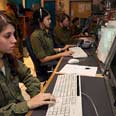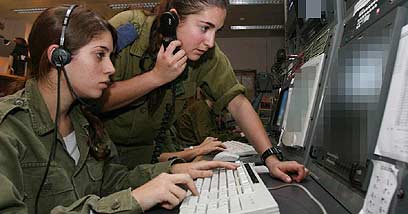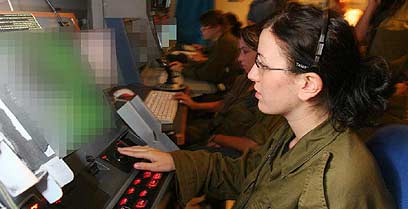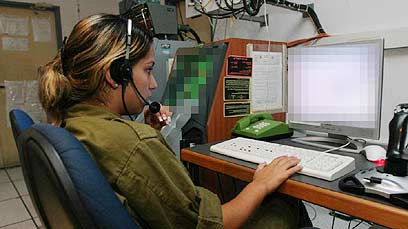
Feminine force behind IDF missile boats
Under shadow of rockets and mortars, young women soldiers direct IDF warships to destroy enemy targets in Lebanon. Girls know it's scary, but important
In recent days, Israel's Navy has intensified its operations to eliminate the threat of rocket attacks on Nahariya, Haifa and the Krayot area. On Sunday, a Ynet crew had the unique opportunity to visit the naval operations room, where young women soldiers direct INF missile boats in their mission to destroy terrorist rocket launchers.
A group of female soldiers, who constitute 80 percent of the personnel in the outpost, have been laboring around the clock for 26 days, in an attempt to prevent a continuation of rocket attacks on the north-west.

Women at work, in an operations room (Photo: Hagai Aharon)
One of these ladies is Cpl. Moran Kdushim, 20, who has served for more than a year in the outpost as a shift leader.
"The first days weren’t easy," she says. "Managing such a complicated operation, while the outpost is under attack from rockets and mortars, is scary, but it's also toughening. The girls here have incredible responsibility on their shoulders and they consider it an honor to have the important job of communicating with the crews at sea."
Kdushim explains that the women's young age doesn't constitute a problem because they underwent extensive training and are now executing the things they have learned. 'Manning' one of the control systems, we met Sgt. Sivan Cohen from Nahariya. While on leave, she spent time with her family in their fortified structure. Back in the army, she sits in front of a control screen, in order to help stop the next barrage from being launched on her home.

In front of a control screen (Photo: Hagai Aharon)
"We've been here for almost three weeks straight…It's like an unending school trip. We have a strong military and, alongside the strength demonstrated by residents of the north such as my parents, we are waging a difficult battle along the Lebanon coast," Sivan says.
After success, comes fulfillment
At approximately 12 p.m. the radars show a group of missile boats that sailed out in order to attack targets on the Lebanon coast, including Hizbullah outposts that house rocket launchers.
Cpl. Nitzan Yogev holds the two way radio and directs the crew to the target. A few seconds later, she receives the report of a direct hit on all targets, a foil of an attempted rocket launch towards Nahariya. The missile-boats, their mission completed, return safely to Israeli shores.
"After every success, there's a feeling of fulfillment. We feel that we helped reduce the damage that could have resulted from that launching," Yogev explains. "We have become a close-knit group over the past three weeks, fighting here, eating here, sleeping here, and feeling that the weight of the mission is on our shoulders."

Focused on helping ships at sea (Photo: Hagai Aharon)
Head of the navy's command and control system in the north, Lt. Cdr. Amnon Kinreich, expressed pride in his unit's operations. "When the fighting started, they wanted to replace the girls who man the station with male combat soldiers and I explained to them that the most effective force for the job was already in place. I supervise the girls in their work in real time…Much of the time, the outpost is under heavy fire."
"To see them sitting in the fortified structure, focused on identifying, and helping the ships' crews, makes me truly proud. Their main job in the battle is ongoing communication with air, land and sea forces, cooperation that is important cooperation both to foil attacks and to assist our forces serving in mortal danger in order to protect residents of the north," he continued.
The Ynet crew watched for two hours, up close, as the girls and their officers, who have already participated in several successful operations in enemy territory, continued their intensive work.
Despite the successes, the fighting continues - shift leaders and deputy shift leaders work 12 hours straight before earning a break and controllers work six hours shifts, staring at the shoreline and border fence, instructing naval teams in various operations and guiding them back to Israeli shores with achievements and, more importantly, with no casualties.
"It's like we're in a closed ship, only without the rocking of the waves," Kinreich concludes. "We're closed off in this room and working around the clock in a closed area – determined to win this battle."










